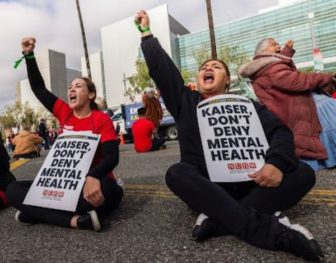California Assemblymember Mia Bonta held the two-page letter in front of her. From her perch at the helm of the Assembly health committee Tuesday afternoon, the Democratic lawmaker read an excerpt from the note, which a Kaiser Permanente leader had sent that day declining her invitation to participate in an informational hearing about the health care giant’s behavioral health services.
“I have to say, I’m supremely disappointed,” said Bonta, whose Assembly District is in Oakland, where Kaiser Permanente has its headquarters.
“I just want to say, for the record, providing a two-page letter to this Legislature where we have an opportunity to actually hear directly from them, engage in conversation about their efforts to be able to support Californians, is this to me —” then she crumpled the letter into a ball.

The National Union of Healthcare Workers, Kaiser Permanente’s mental health care worker union, stages a protest in Los Angeles in February. Photo by J.W. Hendricks for CalMatters
One in four Californians — more than 9 million people — are insured by the health plan, the state’s largest. In recent years, it has come under fire for violations of state mental health laws. The health plan made headlines in 2014 after state regulators fined it $4 million for denying patients timely access to care. In 2023, the Department of Managed Health Care reached a $200 million settlement agreement with Kaiser after finding that the health insurer violated state mental health laws. That included a $50 million fine as well as $150 million in other investments.
Lawmakers wanted updates on those commitments. The hearing was replete with testimony from union representatives, legislators, patients and others about Kaiser’s ongoing troubles in the behavioral health space.
But perhaps the most impactful statement, various legislators and advocates said, was the absence of Kaiser itself.
“I’m also disappointed that Kaiser is not here to speak for themselves,” said Celeste Rodriguez, a Democratic state assemblymember from Los Angeles, who said she herself is a Kaiser patient. “But I also think their absence speaks volumes.”
In the letter to Assemblymember Bonta, and in an emailed statement to CalMatters, Kaiser cited concerns about the involvement of the National Union of Healthcare Workers as an explanation of why it was declining to send a representative to the hearing that bore its name.
“We did not attend the committee’s informational hearing on Kaiser Permanente’s behavioral health care system because we believe it would not have been a productive or balanced discussion,” said the statement from Kaiser spokesperson Terry Kanakri.
The union on Sunday announced a tentative agreement with Kaiser on a new contract for 2,400 mental health and addiction medicine employees in Southern California.
That contract, which will be voted on this Thursday, ends a strike that lasted more than six months and involved a hunger strike, multiple attempts at mediation and a cameo by labor icon Dolores Huerta. It was the second strike by the union in California in the past three years, with the previous one lasting 10 weeks in 2022.
The company in its letter to Bonta – wife of Attorney General Rob Bonta – said it had invested more than $1 billion in improving behavioral health care since 2020, and that it now employs more than 30,000 people for those services.
“Bottom line: today we offer our members more choice and access than ever before, and we meet state requirements for access to behavioral health care. While we have more work to do, we are proud of our behavioral health care and our progress in recent years,” read the letter, which was signed by Kaiser Vice President Simon Borger.
Union leaders at the hearing pointed to a variety of ongoing concerns, including chronic understaffing.
Sophia Mendoza, president of the National Union of Healthcare Workers, told the committee, “All around the state, we’ve heard the same refrain from Kaiser plan members. If you break your arm, if you have diabetes, you’ll get great care. But if you have depression or anxiety, don’t count on getting any help.”
Jocelyn Wiener is a reporter with CalMatters.


Kaiser not showing up to a hearing about its mental health services is pretty telling. If they’ve really made improvements, why not show up and be transparent?